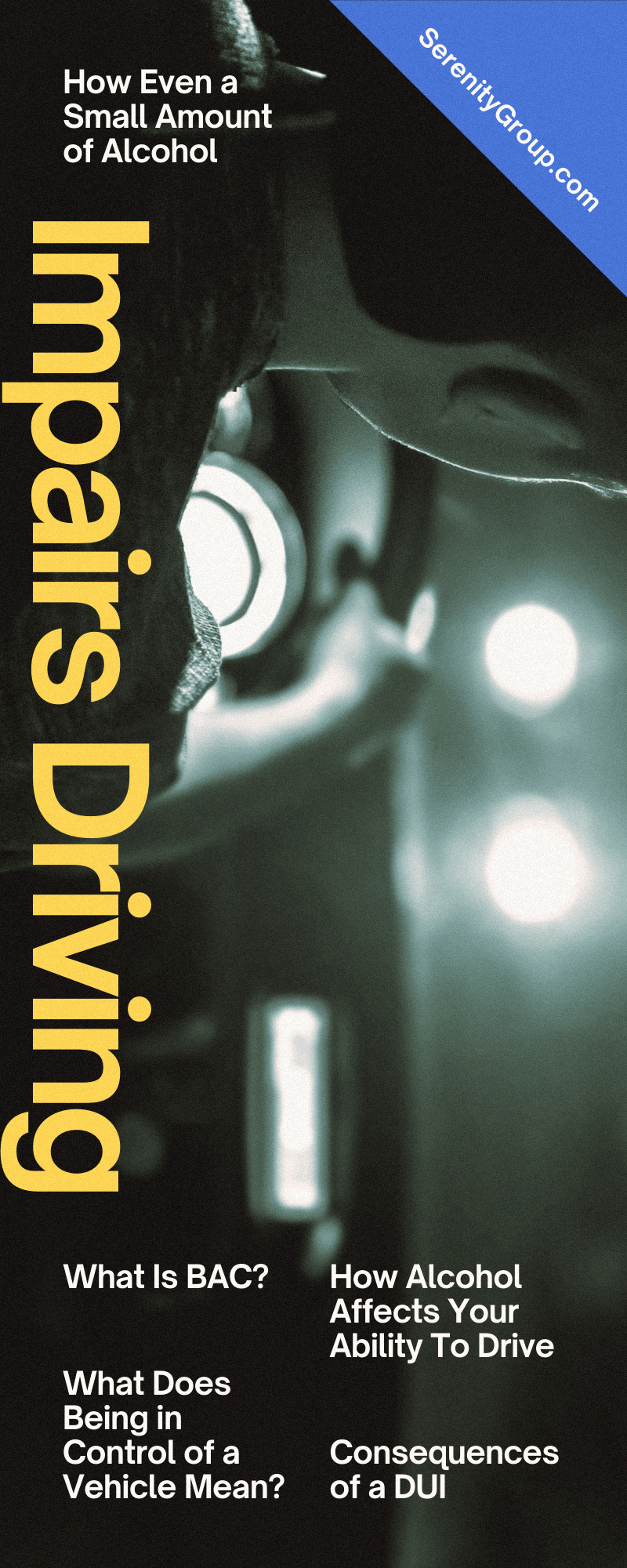How Even a Small Amount of Alcohol Impairs Driving

One of the first things that you’ll notice after drinking alcohol is how your judgment and other mental functions deteriorate. Because alcohol impairs the brain’s decision-making capabilities, people frequently let their guards down, do things they wouldn’t ordinarily do, and make unwise decisions. Many times, this lack of judgment leads to people getting behind the wheels of their cars even though they’re unable to safely drive.
This article will cover how even a small amount of alcohol impairs driving, including the following topics:
- What BAC is;
- How alcohol affects your ability to drive;
- What being in control of a vehicle legally means; and
- The consequences of a DUI
What Is BAC?
The BAC, or blood alcohol concentration, is a measurement with which most people are familiar. The amount of alcohol in a person’s bloodstream determines their blood alcohol concentration. There are three popular methods for verifying this. The first is employing a breathalyzer, which uses the body’s alcohol metabolism to determine the level of intoxicant in the blood. A blood test, on the other hand, can confirm intoxication during a longer period of time. This is because alcohol can stay in a person’s bloodstream for up to 12 hours after consumption. A urine test, which can produce results for intoxication up to 48 hours after ingestion, is the third method for determining BAC.
If a person has a BAC of .08%—the legal federal limit—or more while they are driving, pulled over to the side of the road, or even asleep in the rear of the car, they can be charged with DUI (driving under the influence), as long as they have custody of the keys at the time of the arrest. For each person, the amount of alcohol required to obtain a BAC of .08% is different. This is because a person’s metabolism, height, weight, and even fitness level can all influence the amount of alcohol required to intoxicate that person.
How Alcohol Affects Your Ability To Drive
Alcohol can impair your driving abilities by causing:
- Feelings of tiredness and relaxation, which could lead to them falling asleep behind the wheel;
- Reduced reaction times due to eyesight impairment;
- Diminished vigilance and concentration;
- Problems understanding what’s going on around them and difficulty juggling multiple things at the same time (e.g., keeping in their lane and avoiding other traffic); and
- Failure to follow traffic laws, which can lead to overconfidence and risk-taking.
What Does Being in Control of a Vehicle Mean?
For you to be convicted of a DUI, one must prove that you were in charge of your vehicle at the time. Actual physical control of the vehicle is critical—you must have had “constructive custody” of the key. To put it another way, the key must have been in close enough proximity for you to easily access it. In most circumstances, you must have been in the driver’s seat of the vehicle or extremely close to it, and one must demonstrate that the vehicle was genuinely functional (i.e., not inoperable due to a dead battery or flat tire).
This all seems simple enough, but there have been situations in which people have been arrested for DUIs while standing outside their vehicles. Due to the lack of anybody else in close vicinity to the car, the courts decided that the circumstantial evidence was adequate enough to establish the person’s actual physical control of the vehicle. Despite this, however, most jurors are hesitant to convict someone of a DUI when all signs point to the offender trying to “sleep it off” in a parked automobile.
Consequences of a DUI
Loss of Employment
Driving under the influence is exceedingly dangerous in the near term, but the long-term repercussions could be equally as bad or worse. Take your employment, for example. To ensure their employed staff are trustworthy, many companies now require background checks for many positions. If you’ve been charged with a DUI, it’ll show up on your background check, making it that much more difficult for you to get hired. This is especially true for occupations that require driving, as a corporation will have a difficult time justifying the risk your employment poses to it.
License Revocation
A revoked driver’s license is one of the most serious consequences of a DUI conviction. The revocation will not persist indefinitely, but it will undoubtedly cause stress in your life. If your driver’s license is revoked, simple chores such as shopping and commuting to and from work will become nearly impossible. Taking public transit is an option that many people can consider, but keep in mind that it may not match your schedule and that it may even make your life more difficult.
Higher Car Insurance Rates
Many drivers may not consider the increases in their vehicle insurance rates that may follow a DUI conviction. After a DUI, your insurance premiums are likely to soar, with some circumstances resulting in doubled or tripled auto insurance rates. In most situations, only a firm that offers high-risk SR-22 insurance (also known as a high-risk driver’s certificate) will insure someone who has been convicted of a DUI.
Harm to Family Life
For a variety of reasons, a DUI can harm a person’s connection with their family. Some states will even issue at-fault divorces in reaction to specific offenses such as DUIs. Furthermore, a DUI might have an effect on how a judge decides on child custody in divorce situations. Depending on state legislation, a DUI can also prevent someone from adopting a child in the future.
We hope this article has helped you understand how even a small amount of alcohol can impair your driving as well as the major consequences that a DUI can have on you, your family, and your life. If you have already incurred a DUI and are looking to purchase SR-22 insurance coverage, be sure to reach out to Serenity Group. We are dedicated to ensuring the process of purchasing high-risk insurance is as easy and simple for you as possible.


Recent Comments